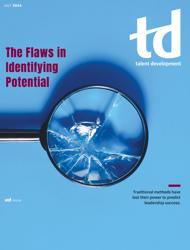TD Magazine Article
Balance Human and Technical Skills
Overreliance on artificial intelligence is damaging the human skills employers desire.
Tue Jul 01 2025

The skill US employers are most looking for in prospective employees is artificial-intelligence literacy, according to LinkedIn's Skills on the Rise 2025 list. The social media platform states that, by 2030, one in seven skills most jobs use will change due to AI. Companies are leaning into those changes because, per McKinsey & Company's 2023 The Economic Potential of Generative AI report, generative AI could add between $2.6 trillion and $4.4 trillion annually to the global economy.
Despite that prediction, LinkedIn's catalog of in-demand skills is heavy on people skills, including conflict mitigation, adaptability, and stakeholder management. The list, which LinkedIn compiled by counting how often site members added new skills to their profiles, highlights emerging opportunities to help employees and employers prepare for what's next in the workforce. LinkedIn also measured hiring success by how often members that companies have hired in the past year have possessed shared skills and emerging demand by the increased presence of a given skill in paid job postings.
Categorizing human skills as those on the rise aligns with fears of the future given recent technological advances. A 2024 Deloitte report shows that 94 percent of workers were concerned that future generations may not have the necessary human skills to succeed in the workplace. Those individuals believe that organizations that rely too heavily on technical training do so at the expense of human capabilities such as adaptability, leadership, divergent thinking, emotional agility, and resilience. Ninety percent of respondents believe human competencies play an essential role in career development. Unfortunately, only 52 percent of the respondents thought their company valued human skills more than technical proficiencies such as learning AI tools.
Sixty-one percent of Deloitte's respondents want employers to emphasize communication as an essential human skill. That matches the findings of a Simmons University Institute for Inclusive Leadership research report. Thriving at Work 2024 states that "ineffective, unclear, infrequent, or non-existent communication, as well as a lack of transparency about expectations, roles, organizational change, priorities, and vision for the future" is stunting the workforce. The report concludes that addressing communication and transparency gaps can drive performance, improve company culture, and help all employees thrive.

